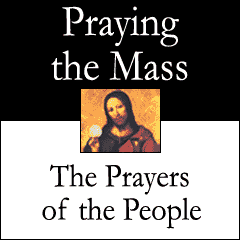Unfortunately they don’t have this for online signing. Nevertheless, here is the John XXIII Coop’s attempt to organise something to counter “That Petition”:
The Australian Bishops need your help …
Sign The Counter-Petition !A petition is circulating in response to the current crisis in priestly vocations. It calls on the Australian Bishops to (inter alia):
“encourage a wide-ranging discussion of the role of women in ministry … including the question of women’s ordination.”
This is in open defiance of the Apostolic Letter of the late Pope John Paul II Ordinatio Sacerdotalis, which states:
Wherefore, in order that all doubt may be removed regarding a matter of great importance, a matter which pertains to the Church’s divine constitution itself, in virtue of my ministry of confirming the brethren (cf Lk 22:32) I declare that the Church has no authority whatsoever to confer priestly ordination on women and that this judgement is to be definitively held by all the Church’s faithful.
A member of the Church’s faithful will thus instantly recognise that the agenda behind this petition is not part of the solution: it is part of the problem!This petition now has some 9000 signatures. It will be presented to the Australian Bishops Conference at the end of November.
What can I do to respond?
• Pray earnestly in all charity for every signatory to this petition, that “their hearts may regain sanity and return to the unity of truth.” (Good Friday Liturgy, Extraordinary Form)• Pray for the Australian Bishops. There is a wonderful opportunity afforded to them by this unfortunate event! Pray that they will have the courage to respond as one to this petition with a clear and forceful articulation of Catholic teaching on the priesthood, and on the obligations of Catholics with respect to magisterial teaching.
• Sign our counter-petition. We want to let the Australian Bishops know that there are many Australian Catholics who are loyal to Holy Mother Church, who are obedient to the magisterium, and who deplore the efforts of dissidents to create a counterfeit Church. We wish to encourage the Australian Bishops in their office as true shepherds of the flock and support their decisive steps to protect it from the predations of wolves.
• Copy and spread our counter—petition and letter amongst your Catholic friends Australia-wide. And don’t forget to return it to the address supplied by November 15 so it can be presented to the Australian Bishops at their November Plenary Conference.
Our Lady Help of Christians, pray for us!
And here is their “Counter petition”:
A Letter to the Australian Bishops
We, the undersigned Australian Catholics, profess loyalty to our Holy Mother the Church, to the Vicar of Christ, Pope Benedict XVI and to the Australian episcopacy as it strives to build up the body of Christ.
1. We acknowledge that there is a drastic shortage of priests and religious serving the Catholic Church in Australia.
2. We submit that this stems predominantly from a systemic undermining by dissidents, over several decades, of Catholic principles in the areas of theology, philosophy, spirituality, liturgy and catechetics.
3. We deplore those efforts of dissident or poorly catechised Catholics to suggest the ordination of women as a solution to the current crisis in ministry. Such open defiance of the magisterium is scandalous and demoralising. We request of you at this time a strong reaffirmation that the Church “has no authority whatsoever to confer priestly ordination on women and that this judgement is to be definitively held by all the Church’s faithful.” ( Ordinatio Sacerdotalis )
4. We believe that, rather than resort to superficial and bogus measures, the only effective way to respond to this crisis is to attack its root cause. We urge the prompt removal of dissident
Catholics from positions of influence in Catholic institutions across the nation, and their replacement with suitably qualified men and women of faith.5. We note as a ‘sign of the times’ that vocations to the priesthood and religious life are languishing in those institutions which have compromised their Catholicity, whereas vocations are flourishing in authentically Catholic institutions in Australia and worldwide.
Sincerely yours,
The Undersigned
Please return this petition by November 15 to:
John XXIII Fellowship Co-op
Box 22 Ormond
Victoria 3204
A little strident, perhaps. I still recommend my “Open Letter to the Catholic Laity of Australia”, as it proposes some positive measures other than chucking out all the dissidents (which would leave us with a very small church!).













